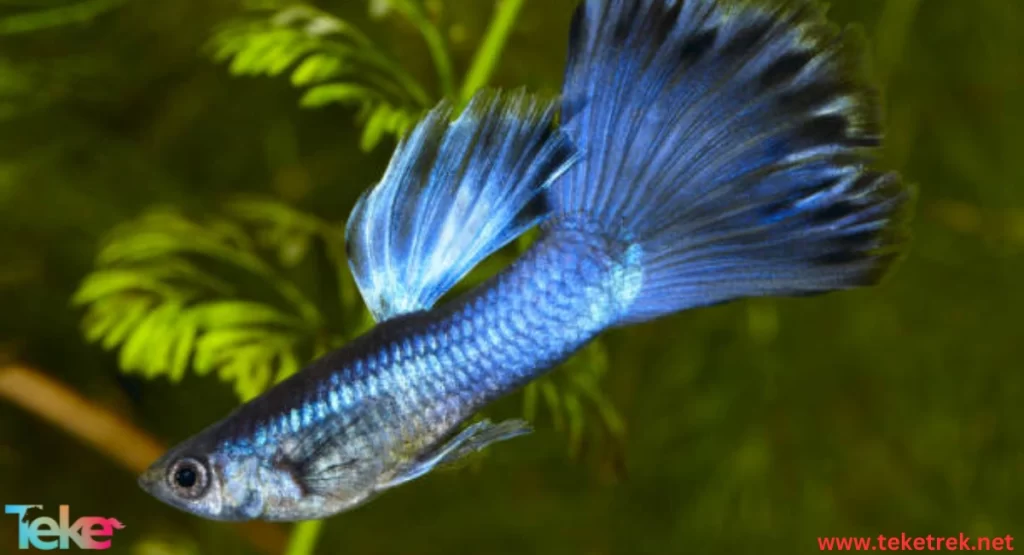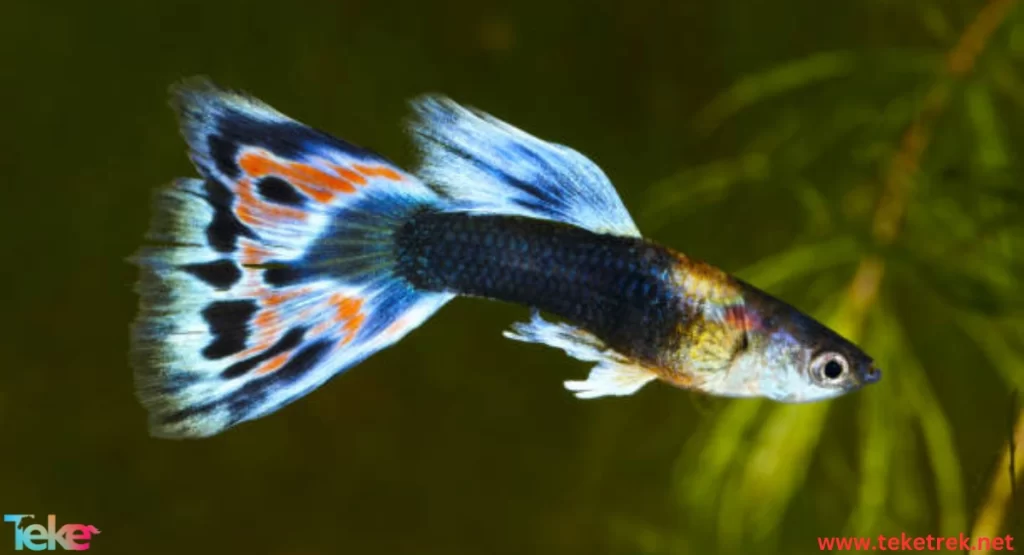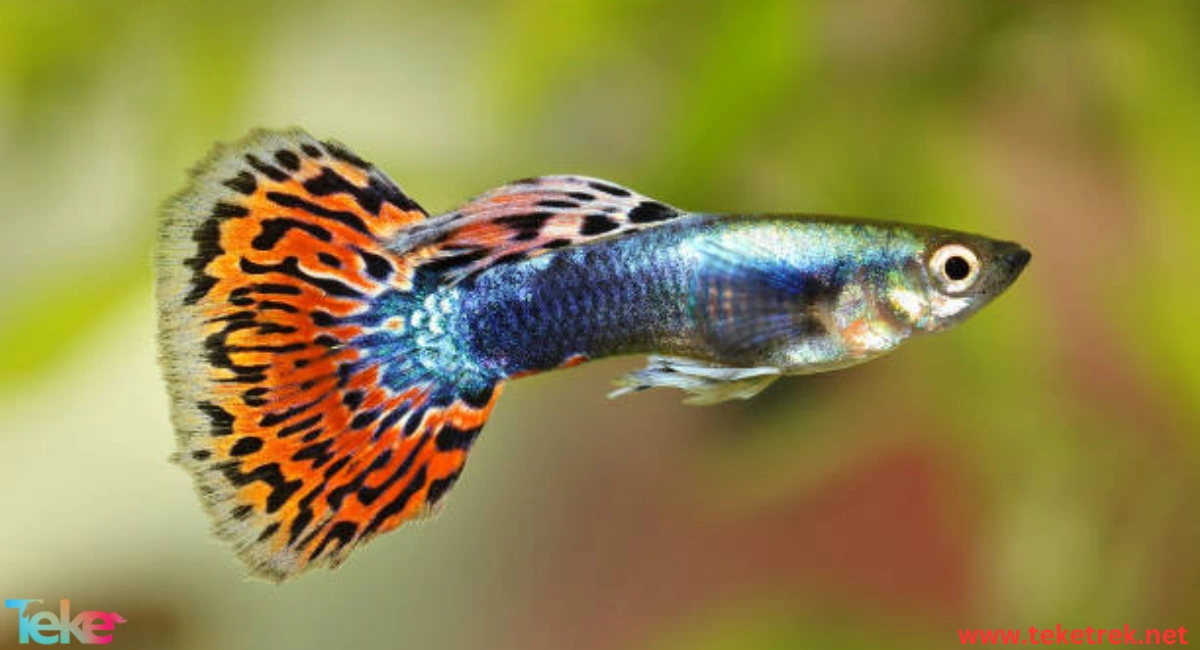“Guppy fish, also known as guppies, are small and beautiful fish that are popular in home aquariums. Although they are lovely pets in aquariums, they can cause significant problems in the wild.
Let’s learn more about it from teketrek.

What are guppies?
Guppies are a type of small tropical freshwater fish commonly found in home aquariums. They belong to the class Actinopterygii, order Cyprinodontiformes, family Poeciliidae. Their scientific name is Poecilia reticulata.
Guppies exhibit sexual dimorphism, meaning there are distinct differences between males and females of this species. Male guppies are known for their vibrant colors, including shades of black, green, orange, red, white, and yellow. In contrast, females have a silvery color.
Size varies based on gender, with males measuring less than 25 to 35 mm, while females are larger, ranging from 40 to 60 mm.
Guppies are often used in genetic research.
Habitat Adaptation:
Guppies are native to certain countries and islands in South America, including Antigua, Barbuda, Barbados, Brazil, Guyana, Suriname, Trinidad, Tobago, and Venezuela. They inhabit both freshwater and slightly brackish water environments, where freshwater and saltwater mix. Their habitats can vary significantly, from streams and rivers to irrigation channels, lakes, ponds, and reservoirs at various elevations.
Guppies are often the only fish species found in heavily polluted water bodies and can tolerate a wide range of aquatic environments. They can withstand temperatures between 18°C and 28°C and salinity up to 150% of seawater. They prefer slightly alkaline water with a pH range of 7.0 to 8.0.
Due to their adaptability, guppies have spread to every continent except Antarctica. In some cases, they were intentionally introduced to control mosquito populations, but they generally had little impact on mosquito numbers. Instead, they negatively affected local ecosystems by consuming native insects and fish eggs.
Diet:
Guppies are carnivorous animals that primarily feed on algae and invertebrates such as insects and detritus in the water. Unfortunately, they have also been observed preying on the eggs and larvae of other fish species, often leading to declines in those populations.
Lifespan:
In the wild, guppies do not live very long, typically around two years. However, various factors, including location and nearby predators, can influence their lifespan. Male guppies reach sexual maturity at around two months, while females mature at three months. Female guppies can store sperm for up to eight months to fertilize eggs as desired. Instead of laying eggs, they give birth to live fry after four to six weeks.
Depending on the female’s age and the presence of nearby predators, the size of the offspring can range from 1 to 100 fry, with an average of 20 to 40. Female guppies can reproduce two to three times per year and continue breeding until they are 20 to 34 months old.
Care Tips:
Guppies are incredibly common in home aquariums. Although they are small and relatively easy to care for, there are essential considerations:
Tank Size:
Guppies need space to swim, so a tank with a capacity of at least 10 gallons (37 liters) is recommended.
Water Parameters:
Wild guppies prefer pH levels between 7.0 and 8.0, but commercially bred guppies can tolerate pH levels between 6.0 and 9.0. Water temperature should range from 21°C to 27°C.
Diet:
Guppies are surface swimmers and sometimes forage at the bottom. Experiment with different types of food to find what suits your guppies best.
Social Behavior:
Guppies are usually happier when kept in groups, so consider having other guppies in the same tank.

Some frequently asked questions about guppies:
- How many guppies should be together?
To determine how many guppies you can safely and comfortably keep in your tank, start with the size of the tank.
Guppies are usually one to two inches long, and you will need to provide a gallon of water for every inch of fish.
So, if you have a 5-gallon tank, you should only keep two or three guppies. If you want a larger number of fish, make sure the tank is large enough to provide the space you need.
It is also better for the number of females to be greater than males.
- How long do guppy fish live?
As a general rule, guppies live between two and three years, and females generally live longer than males. You can extend the life of your guppies by feeding them a good diet, monitoring their health, and maintaining the balance of the tank’s water.
- What are the most prominent physical characteristics of guppies?
Guppy is one of the types of small ornamental fish
It comes in a wide range of colors, such as blue, red, green, and orange
It can be yellow, black, white, or even multi-colored.
- How do guppies reproduce?
The guppy is one of the most common tropical fish
It can be easily raised in captivity and reproduces prolifically
Males and females can be distinguished based on colors and size of fins.
- What is the original habitat of guppies?
Guppies are native to Central America and Brazil
It lives in warm tropical waters, such as ponds, lakes and rivers
It prefers to stay in groups and in herds.
- Are guppies good or bad fish?
Not good it can cause big problems.
In conclusion,
guppies are easy fish to raise, and do not require many requirements Therefore, they are often raised in home ponds, as they give the place a wonderful and attention-grabbing appearance, thanks to their distinctive colors and way of swimming. If you are thinking about raising ornamental fish, guppies are a great choice.
References





